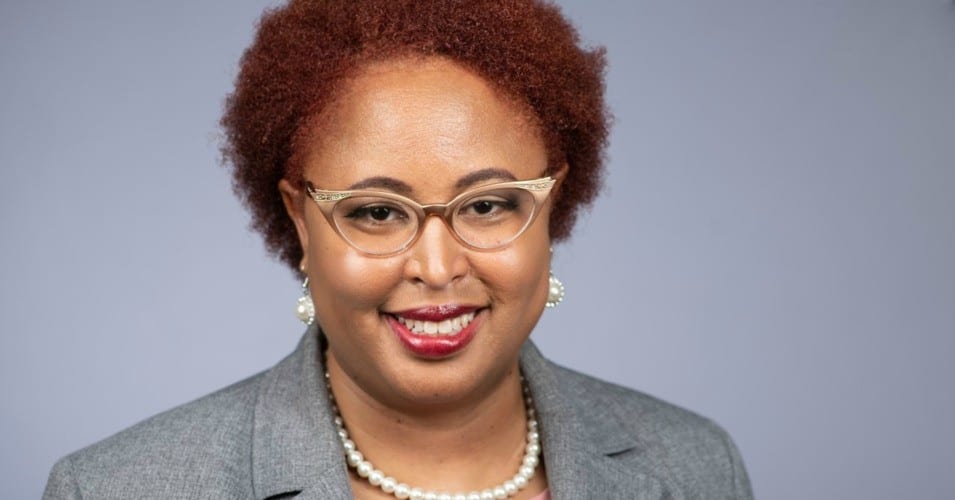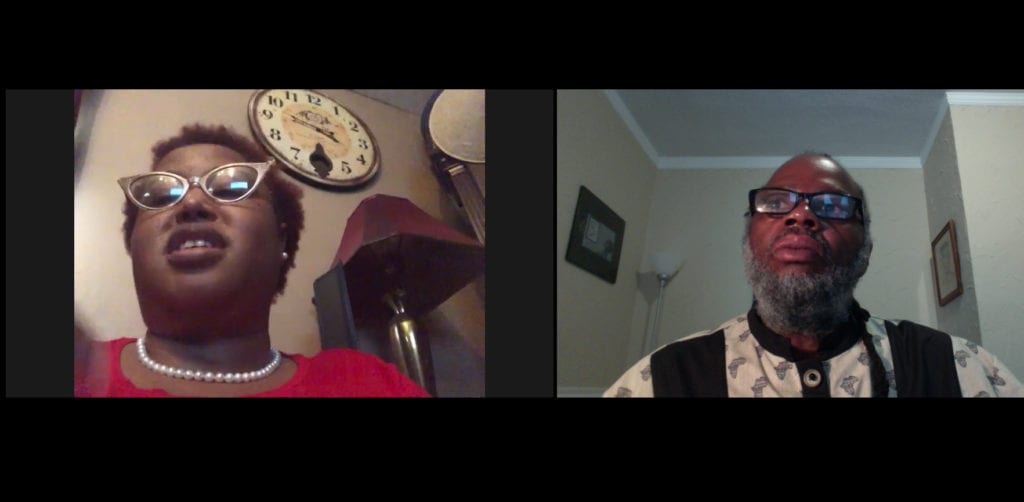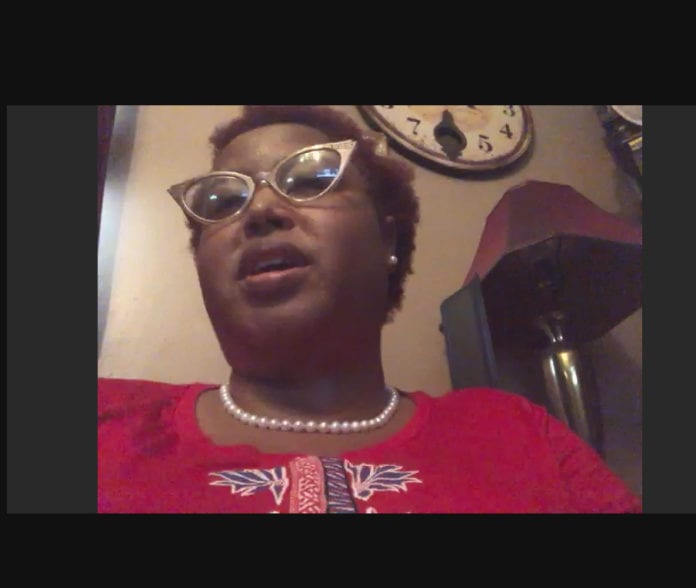Taking a break Wednesday morning from her role as a home-care worker, Marquita Bradshaw, the Democratic Party nominee for the open U.S. Senate seat in Tennessee, created time to talk with The New Tri-State Defender about her stunning win in the Aug. 6 Tennessee Federal Primary Election.

“I’ve been going to work since the beginning (of the campaign) … Monday through Wednesday, anywhere from 10 to 15 hours a day. Then during my breaks, I work on my campaign. After work, I work on my campaign,” said Bradshaw during a video interview with Associate Publisher/Executive Editor Karanja A. Ajanaku.
“Well, I can’t say it’s my campaign. I can say our campaign because there’s a lot of people working with me. Mostly, I’m off Thursday through Sunday and that’s when I really, really ramp up.”
TSD: Will that change going forward as a result of your win?
Marquita Bradshaw: No, because I’ve still got to keep a roof over my head. I’m a single black mother, and the other sources of income that I used to do would put me in and out of homes that would endanger the person (a family member) that I care for….
TSD: One week ago today, what were you doing?
M. Bradshaw: Wrapping up early voting with volunteers, ramping up the GOTV (get out the vote) effort for the 43,000 voters who did not vote that usually vote in elections for Shelby County and also across the state. … I was really concerned …that many people that normally vote didn’t get to vote or hadn’t voted yet. …So I’m trying to get those people out to the polls. We’re pulling and dragging.
TSD: At what point did you decide that you were going to make this run for this office? Was it something that you came up with? Was this part of a collective? How did it surface?
M. Bradshaw: I do serve as a board member, executive committee member for the Tennessee Executive Committee for Sierra Club…and I volunteer in a whole lot of different kinds of ways throughout the community. My whole environmental justice career in Memphis has been a volunteer role for 25 years. … It’s been my passion…
I was doing the Christmas party circuit (in 2018). Some people approached me, and it’s not uncommon for people to approach me to run for office. … (I heard) “Hey, Marquita, you should run for office. There are a lot of open seats, the mayor’s coming up… school board. I think you should run for office.” I was like, “You know what? If I would do anything, I would run for a federal office because of what happened in my community had a lot to deal with how federal policies failed our whole community and is failing a lot of communities across the state of Tennessee….” I said, “If I did anything, I would run for US Senate.” The whole room came to a hush it seems like, but it was like a powerful word that was spoken….
(Later), this opportunity came to me from a lady I met a couple of years ago at the Legal of Women Voters. It’s like, “Hey, I’m in this new role. We have a program that trains and recruit leaders of color to become candidates and campaign operatives.” See, I’ve always been on the opposite sides of campaigns, just doing fieldwork and helping people with GOTV efforts. … I was thinking of everybody else that I was working with, and she’s like, “No, since you’ve been on this environmental thing for a while, I’m thinking of you. You need to come and you need to be prepared to run for office.” …I still wasn’t convinced yet, but then after I started the program (I) saw how comprehensive it was, and it was free. … I was like, “Oh, I want to get picked for this program.”
…(I)t had the missing pieces that I didn’t have for running a complete campaign. It had the campaign management piece, it had the fundraising piece … it had preparing to be a candidate piece. …It put me in different circles, where other elected officials and people were wanting to become candidates themselves. So my network grew from my labor network that I’ve worked in, and my nonprofit networks, and the community work that I’ve worked in, to more people….
I became more and more comfortable with the idea of being a candidate and my life being peeled apart and everything being looked at. …I’m such a private person and quiet as it’s kept, I can get bashful sometimes because I can be really introverted. But when it comes to things I’m passionate about, you can never tell because then I’m an extrovert when I was talking about my passion….That’s how (it) came about.
TSD: So now you’ve got some additional skills relative to being able to run a campaign. It still costs money. How do you think such a small-budgeted campaign was able to unseat such a large amount of money on the other side?
M. Bradshaw: Organizing has always been about people. Whether you’re organizing workers in a new unit, to become a new union, or organizing in the community, you’re always organizing against big money. …When I got started a lot of people thought I was crazy and I was like, “No, I see a path to victory.” They were like, “You don’t have any money. …Those folks are millionaires. What you going to do?” I was like, “When have we allowed not having money to stop us from doing what’s right and serving people? When have we done that as a community, as a black community?” …
Not having money to do things has been my life experience. Really, I didn’t know we were poor until it was time to go to college. …I didn’t want to put that additional burden on my mother … being responsible for my education. …So, I took on that student loan debt … and it took a long time for me to get through college. It wasn’t (a) traditional route. I graduated from the University of Memphis, but I started out at Memphis State.
TSD: You covered some ground; I gotcha. When you graduated, what was your degree in?
M. Bradshaw: Journalism. It started out as Broadcasting and Electronic Media with Communication Studies and Journalism. So it’s a Bachelor of Liberal Science, a hodgepodge of all of those three things. It really fit well with the career path I took because understanding how people communicate is one of the key components in active listening, which is what this campaign is built around….
In politics, usually how it goes is that a candidate says, “OK, this is going to be my platform. And we’re going to have listening sessions, and we’re going to tweak … because I’m the leader, and this is the way I lead. …Well, my leadership style is way different. …I’m the leader of these people who I want to serve. I’m going to listen to them first, and put together a platform based on the narratives, which is the empirical data to drive the policy that we need to have in DC.
TSD: Relative to your active listening up to this point, what are you gleaning that people want you to, do and to advocate?
M. Bradshaw: Well, if you go to my website, marquitabradshaw.com, and you look at those issues, it’s something in there for everybody. …Yes, I am focusing on marginalized communities, because if you make those investments in those marginalized communities, it brings all of the communities up. We are only as strong as a weaker part of our community. …

TSD: We’re in a state that is so heavily Republican, red. Just looking at the numbers, you’d have to have a very significant Democratic turnout, but it also seems like you’d have to be able to have a message that resonates with Republicans on some level. Do you see it that way? And if so, what part of your message do you think might resonate with Republicans?
M. Bradshaw: The messages that the people have put together within our platform versus the message that the Republican nominee is carrying (are) so vastly different. I’ve been stomping across Tennessee before COVID and so that means that I’ve talked to Republicans and I was like, “So, you have all these people that are candidates and they’re not concerned about the internal threats of poverty and racism and they don’t have a platform around education. They don’t have a platform around environment and they don’t have a platform around economy that works for working people. So, are you telling me that in the Republican Party that there’s no one that’s concerned about those issues? Is that really reflective of all the people in the Republican Party?” …
Number two, let’s dispel the myth that this is a Republican state. No, that is not the truth and let’s not repeat it.
TSD: Amplify on that.
M. Bradshaw: This is a state where you have four to five million people that are registered to vote that do not vote. You have more non-voting registered voters than Republicans and Democrats combined. People that are eligible to vote and some of them aren’t registered to vote. … There’s some Republicans that we don’t have time to reach or even activate their base, so we’re not going to even entertain them. But for the Republicans that are concerned about removing the hypocrisy in democracy and moving us forward away from racism, because that’s going to kill our country if we don’t deal with it. If we don’t move from the hypocrisy that everybody is not able to participate in our economy and the hypocrisy not every child has a high quality education. …
The third thing is the environment, the pollution. If we do not deal with the pollution, it don’t matter what kind of economy we got if everybody’s dying, right? …
Republicans are just as concerned about pollution and the environment as Democrats. They might wrap it up and package it in a bow in a different way and their leaders are not speaking about it. Their leaders are not leading in a way that they want them to because they’re continually rolling back regulations. …
There (are) over 100 environmental laws that were made to protect our human health and our environment health. You cannot separate health from the environment. …We know that everyone deserves medical care. Just imagine if people in a COVID environment had access to primary care providers, we could have responded differently than what we’re going through now.
TSD: Now that you’ve gained the nomination, you’ve gotten nationwide notoriety. I envision that organized Democrats from all sorts of places, some with money, are reaching out for you. How do you blend this new infusion of interest into your campaign?
M. Bradshaw: Well, if you want to do things the way it has always been done, this might not be the campaign you need to work with because we are leading with environmental justice principles with the voices of the people who are experiencing the pain. It’s value and is put in this platform. By that way, we are being inclusive and it’s for everybody because we want America to be for all, not just for some people. If you’re on that boat, don’t come this way and that’s all to it. But if you are willing to learn how to do things differently, because it was no feat to be out $2 million, that was a single mother knowing how to stretch a dollar and being connected to community. It ain’t no secret how it’s done, but it takes a lot of work.
If you’re going to talk to this campaign, if you’re looking to get rich because of the money you think is going to come in, that’s not going to happen. Let’s set some ground rules. If you’re coming here to serve, you have a place here. If you’re coming to win and flip this U.S./Tennessee seat and understand that the way that we’re leading is to serve people, then let’s get to work.
…We are building a people-focused platform that’s based on everyone having healthy and safe communities.



